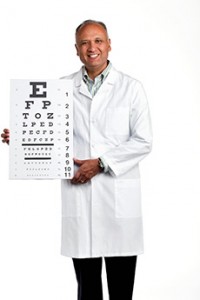State Senator Ed Hernandez and his wife are both optometrists. I couldn’t tell you how much time the Senator has to devote to his practice, given that he is paid a full-time wage by the people of California for his invaluable services in the legislature. Nevertheless, I am sure that this has been a very meaningful occupation for them both.
As optometrists, or Doctors of Optometry in the longer form, the Hernandez would have had to go through some very serious training. But they have not been through medical school.
They haven’t? I know — it’s confusing. Medical doctors that practice on your eyes are called ophthalmologists.
This will probably make it easier to understand…
EyeCareProfessions.com, a website that helps inform prospective eye care professionals about their career options, says this about the difference between optometrists and ophthalmologists —
One of the most common mistakes many patients make is to consider an optometrist and ophthalmologist as the same position, however there is a huge difference between the two. Optometrists are usually the primary health provider for normal vision problems and yearly checkups. The position requires a Doctor of Optometry degree and a license, and allows the diagnosing for common vision acuity problems like farsightedness and nearsightedness, prescribing corrective eyeglasses, contact lenses, dispensing and prescription of certain medication, plus testing for eye diseases and conditions. Optometrists can handle all this, usually in their own office or for a firm.
Ophthalmologists can perform the same functions as optometrists, but are considered a higher position as they actually are medical doctors with Doctors of Medicine or Doctors of Osteopathic Medicine degrees who specialize in the eyes and vision care. This means an ophthalmologist can diagnose and treat highly complicated eyes issues, can perform surgeries like Lasik and repair retinal damage, and can handle more area specific cases in vision care. The main difference between the two eye-related careers is that an ophthalmologist can handle surgeries and other issues that require more training on the medical side.
Clearly just from reading these two paragraphs you can tell that there are real differences between the two occupations. That having been said, Senator/optometrist Hernandez has authored legislation (and it is not the first time), SB 492, that, if passed, would go a long way towards blurring the lines between the two, as it would fairly drastically broaden the scope of things that an optometrist can do, that are things currently only an ophthalmologist can do.
What kinds of things would optometrists be able to do after the magical wave of the legislative wand? I would bore you with the myriad of other new “powers” granted, but it’s easy for me spot the two that would have any optometrist very excited, and no doubt have a substantial positive effect on the balance sheet of Dr. Hernandez Optometry — if SB 492 becomes law, optometrists will be able to administer Botox injections, and they will be able to perform Lasik surgery. Ca-ching.
And off to the slippery slope we go. Clearly there is a market-need for more ophthalmologists. But it seems a pretty serious leap to say that instead of encouraging more people to go through the arduous process of going through years of medical school, years of residency, and perhaps years more of specialized residency — let’s just deal with the supply/demand problem by lowering (substantially) the required training and practice of those performing the services. Anyone see a problem here?
Our friends at EyeCareProfessions.com say this to those carefully weighing the decision between trying to become an optometrist, or an ophthalmologist —
There is major difference in education and training for optometrists and ophthalmologists, but both require post-graduate education at schools that are very competitive to get accepted into, with rigorous requirements.
The road to becoming an optometrist starts with a bachelor’s degree, the OAT, and acceptance into one of the few optometry schools. Optometry schools require 4 years of didactic coursework and clinical training, with the last year usually packed with rotations through clinics, hospitals, and other medical facilities. After graduating, optometrists can obtain a license and start working, or they can continue training through a residency program which generally is one year in length. The residency offers extra hands on training in specific areas such as glaucoma. Click for more information on optometric residency.
For ophthalmologists, the road begins with a bachelor’s degree, the MCATS, and acceptance to one of the more than one hundred medical schools. Medical schools include 4 years of classes, clinical assignments, and other training methods in all aspects relating to medicine and health. Unlike optometry schools that focus on the eyes and vision, medical schools encompass care for the entire body. After medical school, the graduate must complete a required first year clinical residency program, or PGY-1. After this is completed, the graduate must then complete a 3 year residency based on ophthalmology, and those who want to specialize even more will continue training through fellowships in specific areas for another 1 to 3 years. This means at least 8 years of post graduate education and training is needed to become an ophthalmologist, and even more to become more specialized in specific areas like pediatric ophthalmology.
So, with all due respect to Senator/optometrist Hernandez, while I understand that it’s a little late in life for you to go to medical school, and go through all of the other rigorous education and training to become an ophthalmologist, I simply do not think that lowering the standards of who can perform these advanced procedures and surgeries is a wise idea.
I encourage legislators to reject this bill, despite the awkwardness associated with how important it is to Senator Hernandez, and his future earning potential.



